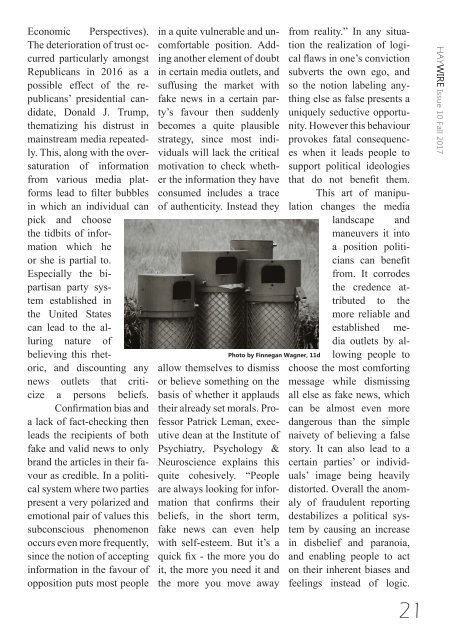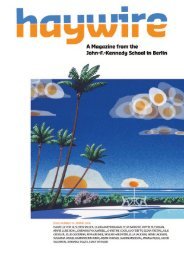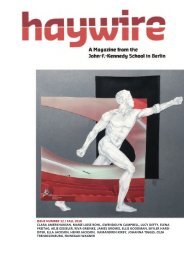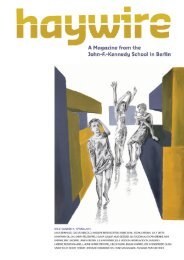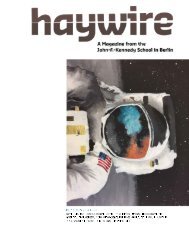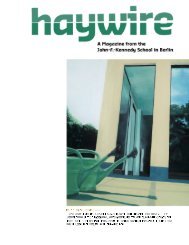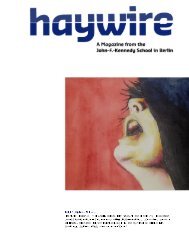HAYWIRE Issue 10 Fall 2017
Create successful ePaper yourself
Turn your PDF publications into a flip-book with our unique Google optimized e-Paper software.
Economic Perspectives).<br />
The deterioration of trust occurred<br />
particularly amongst<br />
Republicans in 2016 as a<br />
possible effect of the republicans’<br />
presidential candidate,<br />
Donald J. Trump,<br />
thematizing his distrust in<br />
mainstream media repeatedly.<br />
This, along with the oversaturation<br />
of information<br />
from various media platforms<br />
lead to filter bubbles<br />
in which an individual can<br />
pick and choose<br />
the tidbits of information<br />
which he<br />
or she is partial to.<br />
Especially the bipartisan<br />
party system<br />
established in<br />
the United States<br />
can lead to the alluring<br />
nature of<br />
believing this rhetoric,<br />
and discounting any<br />
news outlets that criticize<br />
a persons beliefs.<br />
Confirmation bias and<br />
a lack of fact-checking then<br />
leads the recipients of both<br />
fake and valid news to only<br />
brand the articles in their favour<br />
as credible. In a political<br />
system where two parties<br />
present a very polarized and<br />
emotional pair of values this<br />
subconscious phenomenon<br />
occurs even more frequently,<br />
since the notion of accepting<br />
information in the favour of<br />
opposition puts most people<br />
in a quite vulnerable and uncomfortable<br />
position. Adding<br />
another element of doubt<br />
in certain media outlets, and<br />
suffusing the market with<br />
fake news in a certain party’s<br />
favour then suddenly<br />
becomes a quite plausible<br />
strategy, since most individuals<br />
will lack the critical<br />
motivation to check whether<br />
the information they have<br />
consumed includes a trace<br />
of authenticity. Instead they<br />
Photo by Finnegan Wagner, 11d<br />
allow themselves to dismiss<br />
or believe something on the<br />
basis of whether it applauds<br />
their already set morals. Professor<br />
Patrick Leman, executive<br />
dean at the Institute of<br />
Psychiatry, Psychology &<br />
Neuroscience explains this<br />
quite cohesively. “People<br />
are always looking for information<br />
that confirms their<br />
beliefs, in the short term,<br />
fake news can even help<br />
with self-esteem. But it’s a<br />
quick fix - the more you do<br />
it, the more you need it and<br />
the more you move away<br />
from reality.” In any situation<br />
the realization of logical<br />
flaws in one’s conviction<br />
subverts the own ego, and<br />
so the notion labeling anything<br />
else as false presents a<br />
uniquely seductive opportunity.<br />
However this behaviour<br />
provokes fatal consequences<br />
when it leads people to<br />
support political ideologies<br />
that do not benefit them.<br />
This art of manipulation<br />
changes the media<br />
landscape and<br />
maneuvers it into<br />
a position politicians<br />
can benefit<br />
from. It corrodes<br />
the credence attributed<br />
to the<br />
more reliable and<br />
established media<br />
outlets by allowing<br />
people to<br />
choose the most comforting<br />
message while dismissing<br />
all else as fake news, which<br />
can be almost even more<br />
dangerous than the simple<br />
naivety of believing a false<br />
story. It can also lead to a<br />
certain parties’ or individuals’<br />
image being heavily<br />
distorted. Overall the anomaly<br />
of fraudulent reporting<br />
destabilizes a political system<br />
by causing an increase<br />
in disbelief and paranoia,<br />
and enabling people to act<br />
on their inherent biases and<br />
feelings instead of logic.<br />
21<br />
<strong>HAYWIRE</strong> <strong>Issue</strong> <strong>10</strong> <strong>Fall</strong> <strong>2017</strong>


